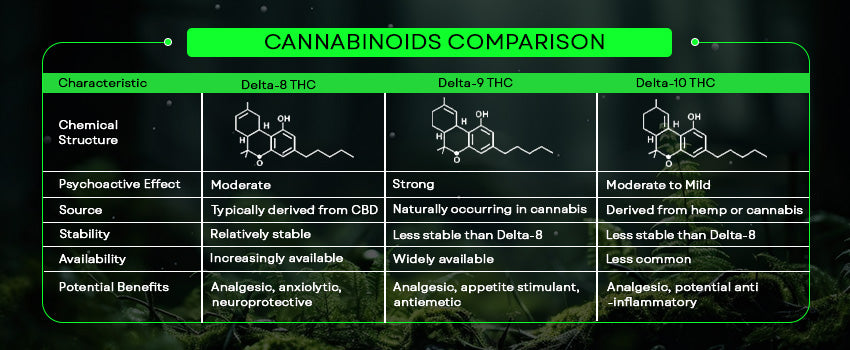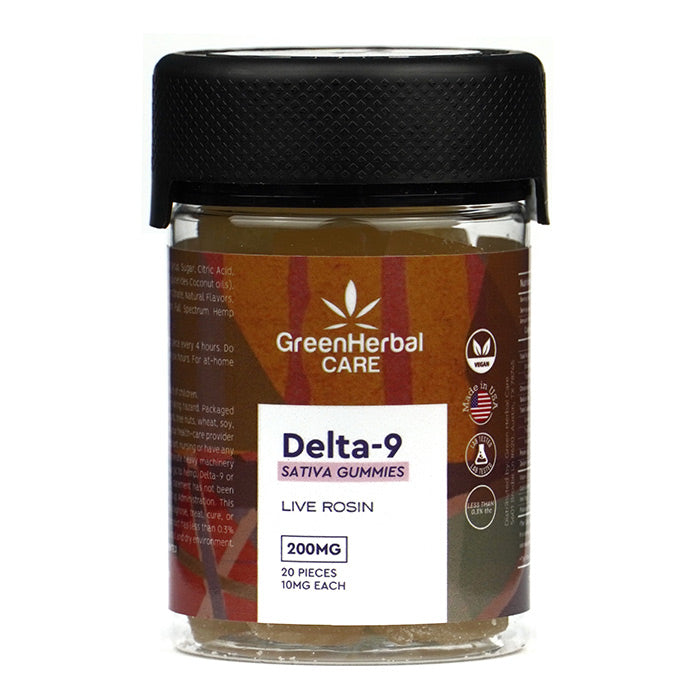The cannabis industry is moving up in the world with every passing day, thanks to one crucial component - THC. Tetrahydrocannabinol, or THC, is the element that causes the “high” associated with cannabis use. This naturally-occuring substance is already quite popular for its psychoactive properties.
The cannabis industry is moving up in the world with every passing day, thanks to one crucial component - THC. Tetrahydrocannabinol, or THC, is the element that causes the “high” associated with cannabis use. This naturally-occuring substance is already quite popular for its psychoactive properties.
Importance of Understanding the Differences
Understanding the differences between the three is essential, whether you are a consumer, policymaker, or healthcare professional. Why? So that you don’t confuse them and end up buying Delta 9 products when looking for the euphoric Delta 10.
The distinctions between the three affect your overall experience because each has a different level of psychoactive effects, therapeutic properties, legal status, and regulatory considerations. Knowing every cannabinoid well can help you make informed decisions.
What is Delta-8 THC?
Delta-8 is a cannabinoid similar to Delta-9 but featuring a slightly different chemical structure. It comes from hemp-derived CBD through a process called isomerization. This hemp-derived Delta-8 is legal in most states. Many people choose to buy delta 8 online due to its convenience and accessibility.
Effects
Consumers report a subtle euphoria characterized by reduced paranoia and anxiety. Its milder psychoactive effects make it a preferred option for many. Not to mention, it has potential therapeutic benefits like reduced nausea and anxiety, appetite stimulation, and reduced pain and inflammation, adding to its charm.
Some also report experiencing better mental clarity and focus without the sedative effects of Delta-9 THC.
Shop Delta 8 THC Products
Delta-9 THC: The Traditional Player
It is the most well-known cannabinoid. It has a similar chemical structure to Delta-8 but comes directly from cannabis plants.
It is the most well-known cannabinoid. It has a similar chemical structure to Delta-8 but comes directly from cannabis plants.
Delta-9 THC comes under strict regulations because of its intoxicating properties, which, despite its potential therapeutic applications, makes it a little legally complicated as there are concerns about the overuse of various products like Delta-9 live rosin gummies and pre-rolls.
Effects
Delta-9 is THC, the element responsible for enjoying altered perceptions. These effects arise from its interaction with the ECS in the brain, particularly the CB1 receptors.
People love to use it for recreational purposes, to enjoy relaxation and euphoria. However, besides the high, Delta-9 THC also boasts potential therapeutic benefits, such as appetite stimulation, pain relief, and nausea reduction. If you are looking for Delta 9 thc for sale, ensure you are aware of the legalities in your area.
Shop Delta 9 THC Products
Exploring Delta-10 THC
Delta-10 THC is a relatively new cannabinoid. It is lesser known but possesses high potential. It is hemp-derived and has a unique chemical structure.
Since it is new, its properties and effects are under investigation. However, emerging studies suggest distinct potential wellness benefits, which even many users report. It is nowhere near as potent as Delta-9 but is less potent than Delta-8, which makes it rapidly grow in popularity.
Effects
Delta-10 THC is perfect for those seeking an uplifting and stimulating high, which is less sedating and more energetic. Users say they use Delta-10 products, such as delta 10 disposable, for recreational purposes, to enjoy good mood, focus, and creativity.
Comparing Delta-8, Delta-9, and Delta-10 THC

While chemically similar, these three cannabinoids are distinct and demonstrate different potency levels and psychoactive effects. Here are the differences elucidated.
Psychoactive Effects
- Delta-8 THC: Moderate
- Delta-9 THC: Strong
- Delta-10 THC: Moderate to Mild
Source
- Delta-8 THC: Usually derived from CBD
- Delta-9 THC: Occurs naturally in cannabis and hemp
- Delta-10 THC: Acquired from cannabis or hemp
Stability
- Delta-8 THC: Relatively stable
- Delta-9 THC: Not as stable as Delta-8 THC
- Delta-10 THC: Not as stable as Delta-8 THC
Availability
- Delta-8 THC: Increasingly available
- Delta-9 THC: Widely available
- Delta-10 THC: Relatively uncommon
Potential Benefits
- Delta-8 THC: Analgesic, anxiolytic, neuroprotective
- Delta-9 THC: Analgesic, appetite stimulant, antiemetic
- Delta-10 THC: Analgesic, potentially anti-inflammatory
Potency and Effects: Which THC is strongest?
Another key difference between the three types of THC is potency and effects. Potency describes how much THC is required to create a given effect, while effects describe the quality and intensity of the experience.
How potent is Delta 8 THC?
Delta 8 THC is weaker than Delta 9 THC but stronger than Delta 10 THC.
Delta 8 THC binds to the CB1 receptor with lesser affinity, causing the psychoactive effects of THC, and more affinity to the CB2 receptor, which plays a role in the anti-inflammatory and immune-modulating effects of THC.
Delta 8 THC also possesses a lower bioavailability, indicating less THC is transported into the bloodstream when ingested.
By some estimates, Delta 8 THC is roughly 50-70% as potent as Delta 9 THC.
How potent is Delta 9 THC?
Delta 9 THC is the strongest and most ubiquitous form of THC. Delta 9 THC has a strong binding affinity for the CB1 receptor and thus is stronger at producing the psychoactive effects of THC.
Delta 9 THC is highly bioavailable, meaning that a higher percentage of THC finds its way into the bloodstream when ingested.
Delta 9 THC is present in different cannabis products, including flowers, concentrates, edibles, and oils, with different degrees of potency and purity.
Delta-9 is more 'natural' since it is present in abundance during the natural life cycle of the cannabis plant, whereas Delta-8 and Delta-10 are synthesized through conversion processes due to their smaller availability.
How strong is Delta 10 THC?
Delta 10 THC is the weakest and least researched type of THC. Delta 10 THC has a low binding affinity for the CB1 and CB2 receptors, which contributes to it being less capable of bringing about the effects of THC.
Delta 10 THC also has low bioavailability, meaning very little THC makes it into the blood when ingested.
Delta 10 THC is not originally found in cannabis plants but is artificially produced from hemp. It remains a novelty product in the market, and its availability and quality remain highly unpredictable.
What can each THC be utilized for?
Another distinction among the three forms of THC is their possible benefits and uses. Benefits are the good effects that THC can provide to different health conditions, while uses are the purposes why individuals use THC.
Possible benefits of Delta 8 THC
Delta 8 THC has been found to possess some possible benefits, including:
- May be effective against certain psychological issues
- May provide relief from stress
- May help soothe chronic physical discomfort
Potential advantages of Delta 9 THC
Delta 9 THC has numerous potential advantages, including:
May be effective against certain psychological problemsMay induce hunger in people with low appetite
May be effective against nauseaMay help reduce physical discomfortMay work against sleep disordersPotential Benefits of Delta 10 THC
- May create a sensation of relaxation and euphoria
- May alter sense of time
- May induce hunger in individuals with low appetite
- May alleviate physical discomfort
- May be effective against certain psychological issues
- May improve sleep quality
Based on some anecdotal accounts, delta 10 THC can potentially have the following effects:
- Relaxation and euphoria
- Altered sense of time
- Increased hunger
- Pain alleviation
- Anxiety alleviation
- Better sleep
Note: There is very little scientific data to back up these claims, and further studies are required to determine the full range of delta 10 THC's effects, benefits, and dangers.
Delta 10 THC is also a psychoactive compound, which means it can cause intoxication and impair your judgment, memory, and coordination.
Legal Considerations and Regulatory Landscape
Before wrapping things up, you need to take a look at the legality of THC. At a federal level, Delta-8 and Delta-10 are technically legal owing to the Farm Bill of 2018, which legalized buying, selling, and growing. The defined hemp as a plant that contains less than 0.3% of Delta-9 THC by dry weight.
However, the Farm Bill explicitly focuses on Delta-9 and not the other two compounds. Naturally, products containing Delta-8 and Delta-10 fall into a legally gray area.
However, the Farm Bill explicitly focuses on Delta-9 and not the other two compounds. Naturally, products containing Delta-8 and Delta-10 fall into a legally gray area.
Many states have introduced laws against synthetically fabricated cannabinoids. The origin of Delta-8 and Delta-10 in products might be debatable, but they do appear naturally in cannabis plants. Then again, the definition of a “synthetic cannabinoid” can be inclusive enough to add any cannabinoid made synthetically to the list, even commercial D8 and D10 products.
Both Delta-8 and Delta-10 are explicitly restricted in a few states because of the controversies revolving around these cannabinoids. Considering this fact, it is also assumable that lawmakers will soon introduce new state-level norms restricting these cannabinoids.
Signing-Off
Understanding the nuances of these cannabinoids can help make informed decisions. Whether you want to buy Delta-8 pre-rolls, Delta-9 gummies, or Delta-10 carts, you will have better knowledge of the scientific, legal, and regulatory landscapes.
Even though each of these cannabinoids provides potential benefits with their unique properties, there are concerns over their legality, regulations, and safety. Continuous research and regulatory clarity are crucial to maneuver the complexities and exploit the therapeutic potential of THC derivatives.

